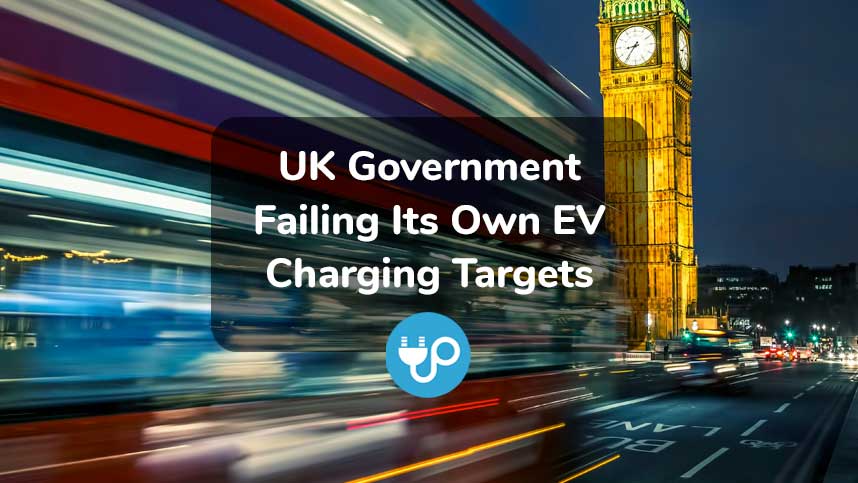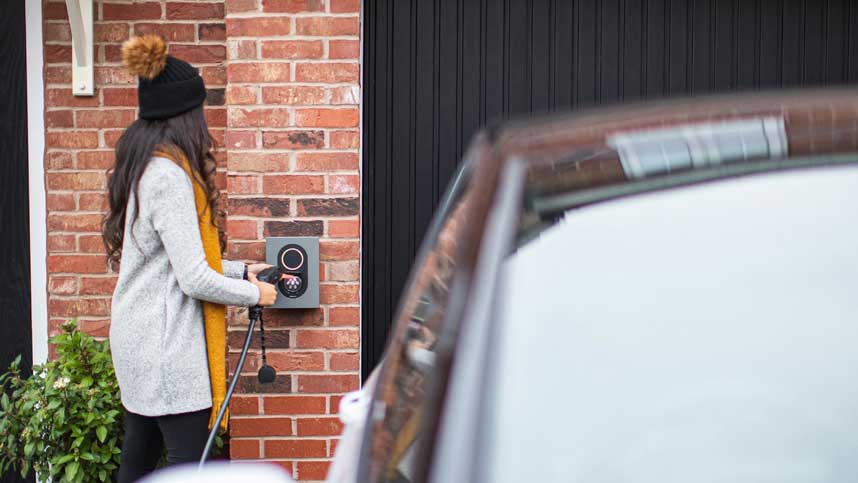
The UK Government is Failing Its Own Targets – EV Charger Sharing Can Plug the Gap!
In recent years, the global surge in spending on electric vehicles (EVs) and charging infrastructure has been remarkable, with a 77% increase to $273 billion in 2021.
In the UK, the transition to electric vehicles has seen considerable progress, with 1,135,000 plug-in cars registered as of January 2023.
However, as the country strives to achieve its ambitious EV targets, certain critical goals set by the government are being missed, impacting the accessibility and availability of public EV charging stations.
With the UK Government consistently failing its own EV charging infrastructure targets, could charger sharing potentially plug the gap?
We discuss this potential solution in greater detail below.
Chapters
Targets Missed
The UK government has consistently missed several targets surrounding EV charging infrastructure, as well as commitments to reducing emissions and greenhouse gases.
Most notably, the government has failed to achieve two important milestones in relation to public EV charging:
- It failed to meet its own motorway service station rapid EV charger target by the end of 2023.
- Only 28% of local authorities published a strategy on delivering EV charging infrastructure in their area.
Is the current EV charging network big enough?
While the government aims to have at least 300,000 public chargepoints by 2030, the Climate Change Committee estimates a need for around 280,000 chargepoints.
The existing network may be perceived as sufficient, but disparities between regions, rather than a North-South divide, pose a challenge.
Policy responses are crucial to address the inequality in chargepoint distribution.
Disparity between regions in the distribution of chargepoints is evident.
While Greater London showcases best practices with 101 chargepoints per 100,000 people, areas like Greater Manchester fall behind with 16.6 chargepoints per 100,000 people.
Local authorities play a vital role in deciding chargepoint locations, but a lack of strategies and policies hinders progress. Targeted policy responses are essential to address these disparities.
Is the Government’s Strategy Fit for Purpose?
The government's commitment to delivering 300,000 public charge-points by 2030 is commendable, but the burden on local authorities lacks adequate support.
Recommendations include support for local delivery, introducing interim targets, fair funding allocation, reducing VAT at public chargepoints, and flexibility on the target.
Delivering an ambitious Zero Emission Vehicle (ZEV) mandate on time is crucial for a smoother transition to EVs.
The wider issue is, polling indicates dissatisfaction among nearly three-quarters of EV owners with the public charging system.
Concerns include non-working chargers, difficulties in payments, and issues related to running out of charge during long journeys.
Despite challenges, prospective drivers show a strong preference for electric or hybrid vehicles, indicating a positive shift in public sentiment.
What are the Possible Solutions?
The challenges posed by the missed targets in public EV charging infrastructure demand innovative solutions, and one promising avenue is the sharing economy of home EV chargers.
In the face of growing EV adoption, these platforms play a pivotal role in enhancing accessibility and convenience for EV owners.
1. Shared Home EV Chargers
Shared home EV chargers offer a decentralised and community-driven approach to charging solutions.
Platforms like Joosup facilitate the sharing of private charging stations among EV owners, creating a network that compliments public charging infrastructure.
This model taps into the existing resources of individuals who have home charging capabilities but are willing to share them with fellow EV users.
The added benefit of platforms such as this is it provides reliable, bookable and highly affordable EV charging, making it accessible to all.
2. Community Collaboration
By fostering a sense of community collaboration, shared home EV chargers address the challenge of unevenly distributed public charging points.
Individuals with off-street parking, such as a garage or driveway, can contribute to the expansion of the charging network by making their private chargers available to others.
This not only helps bridge the gap in regions with limited public charging options but also fosters a sense of shared responsibility among EV owners.
3. Enhancing Accessibility
Shared home EV chargers significantly enhance the accessibility of charging options, especially for those without the luxury of off-street parking.
In urban areas where public charging infrastructure might be scarce, these platforms create a distributed network that caters to the needs of a broader demographic.
This inclusivity is vital for ensuring that the benefits of EV ownership are not confined to specific geographic areas or demographics.
4. Joosup & Similar Platforms
Platforms like Joosup play a crucial role in orchestrating the sharing process.
By providing a user-friendly interface and secure transaction mechanisms, these platforms facilitate trust and seamless interactions between charger owners and users.
The emphasis on community-driven solutions also aligns with the broader shift towards sustainable and collaborative practices.
5. Environmental Impact
Beyond the immediate benefits of addressing charging infrastructure gaps, shared home EV chargers contribute to the overall environmental impact of EV adoption.
By optimising the use of existing resources and reducing the need for extensive new public infrastructure, this model aligns with sustainability goals, making EV ownership even more eco-friendly.
Conclusion
As the government grapples with the challenges of achieving its EV targets, the role of the private sector becomes increasingly crucial.
It is evident that citizens and businesses are becoming the true trailblazers in the pursuit of cleaner, emissions-free roads, stepping up where the government falls short.
Shared home EV chargers represent a tangible and scalable solution to the challenges faced by the UK in meeting its EV targets.
These platforms not only provide a practical response to the deficiencies in public charging infrastructure but also foster a sense of community engagement, turning individual EV owners into active contributors to the broader transition to cleaner and more sustainable transportation.
Blog Archive
- Where Can I Charge My Electric Car?
- Electric Car Maintenance and Servicing Guide
- How Often Should I Charge My Electric Car?
- How to Check EV Battery Health
- Do Electric Cars Pay Road Tax?
- October 2024 Budget: Key EV News
- EV vs ICE – Which is Best?
- Should I Charge My EV to 80 or 90 or 100%?
- UK Government Announces Hybrid Sales Allowed Until 2035
- BEV vs PHEV – What’s the Difference?
- Definitely Not A Guru (Jim Starling) Reviews Joosup
- How Long Do Electric Car Batteries Last?
- 25 New Electric Car Brands on UK Roads
- General Election 2024: Major Party Net Zero Policies Compared
- Electric Car Service Costs vs ICE
- CHAdeMO vs CCS – What’s the Difference?
- Mr EV Reviews Joosup
- What is the ZEV Mandate?
- Spring 2024 Budget: No VAT Rate Cut on Public EV Charging
- What is Regenerative Braking?


